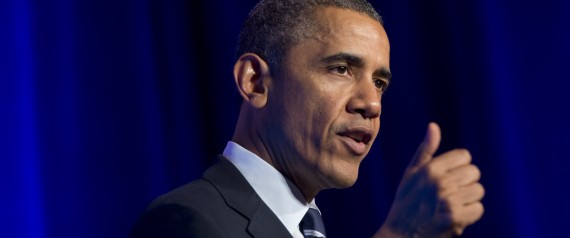Obama Gets Behind Democrats' $10.10 Minimum Wage Proposal
Posted: 11/07/2013 6:16 pm EST | Updated: 11/07/2013 6:27 pm EST

Dave Jamieson
Become a fan
dave.jamieson@huffingtonpost.com WASHINGTON -- President Barack Obama is throwing his support
behind congressional Democrats' proposal to raise the minimum wage to
$10.10 and peg it to inflation, more than a dollar higher than the $9
proposal he made in his State of the Union address in February.
WASHINGTON -- President Barack Obama is throwing his support
behind congressional Democrats' proposal to raise the minimum wage to
$10.10 and peg it to inflation, more than a dollar higher than the $9
proposal he made in his State of the Union address in February.A White House official confirmed to HuffPost Thursday that the administration backs the legislation introduced earlier this year by Sen. Tom Harkin (D-Iowa) and Rep. George Miller (D-Calif.). The Hill reported Thursday that Senate Majority Whip Dick Durbin (D-Ill.) said the White House was willing to get onboard with the measure.
"The President has long supported raising the minimum wage so hardworking Americans can have a decent wage for a day’s works to support their families and make ends meet, and he supports the Harkin/Miller bill that accomplishes this important goal," the White House official said in an email.
Harkin and Miller have said that a minimum wage hike to $9 would be insufficient. The president's support of the $10.10 proposal may help more Democrats rally around the bill as the Senate takes it up in coming weeks.
"We are very pleased President Obama endorsed a $10 an hour minimum wage bill," Aaron Albright, a spokesman for Miller, said in an email. "This action unites all Democrats and minimum wage advocates behind one proposal that addresses income inequality in a powerful way. Congress must move to raise the minimum wage now."
The White House's move was applauded by advocates for low-wage workers, who haven't seen the federal minimum wage raised since 2009, after a series of increases signed into law by President George W. Bush. In states that don't mandate a higher one, the wage floor remains $7.25 per hour.
"The White House got this ball rolling in a big way by putting this in the State of the Union," said Judy Conti, federal advocacy coordinator at the National Employment Law Project. "I think they've come to a point where they realize the economy deserves a robust minimum wage. The jobs we're creating are hourly jobs with low wages. We need to do everything we can to raise it."
The $10.10 figure in the Harkin-Miller proposal isn't arbitrary. Progressive economists like to point out that if the minimum wage had kept pace with inflation since its high in the late 1960s, it would now be above $10. Of course, it's possible the president's original $9 proposal could weaken Democrats' bargaining position with the House GOP. Republicans may seek a smaller minimum wage hike, if they agree to one at all. Republican leaders have already called it a job-killer.
During his State of the Union address, Obama argued that hiking the minimum wage would improve the lives of millions of workers and their families.
"Even with the tax relief we’ve put in place, a family with two kids that earns the minimum wage still lives below the poverty line. That’s wrong," Obama said. "Tonight, let’s declare that in the wealthiest nation on Earth, no one who works full time should have to live in poverty."
While the federal minimum wage has held steady, many states and municipalities have continued to raise or implement their own minimum wages. Just this week, New Jersey voters approved a minimum wage bump to $8.25 per hour. Last month, California lawmakers raised theirs to $10, making it the highest state minimum wage in the nation.
The congressional Democrats' proposal would raise the minimum wage to $10.10 through a series of increases, then it would be adjusted each year according to inflation. The minimum wage would also rise for restaurant servers and other tipped workers, whose employers can pay them as little as $2.13 before tips. The minimum wage for those workers would be set at 70 percent of the regular minimum wage.
